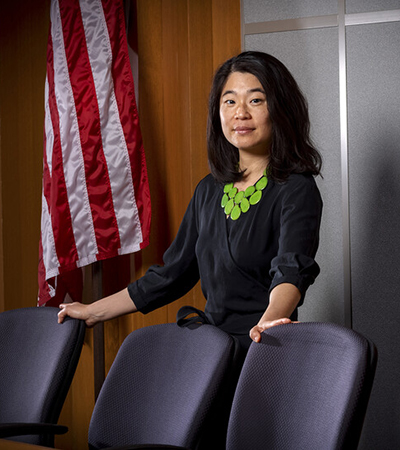16 Dec 2022

Political Scientist Dr. Alice Kang recently received the C. Herman Pritchett Book Award from the American Political Science Association for her latest work, “Reimagining the Judiciary: Women's Representation on High Courts Worldwide.”
Along with her co-authors, Kang has been instrumental in creating the first international database of when and how women are elevated to high courts. A grant from the National Science Foundation made this work possible. The findings show that women often were appointed to high court when a country was being influenced by the changing norms of nearby countries. The database covers judicial appointments of women to courts equivalent to the U.S. Supreme Court in both developing and stable democracies. Kang’s study is one of the first to apply an international lens to research on judicial appointments of women, she explained in a conversation with University Communication last year.
Kang shared her findings with legal professionals this fall in a discussion facilitated by the College of Law’s Women’s Leadership Initiative. Kang said it was helpful talking to members of the Nebraska community about their experiences.
“It was really nice to be able to talk with people in the state about their observations and analyses of what encourages diversification of the judiciary, because it is still predominantly male and white,” she said.
Having women in the judiciary is important for several reasons, Kang said.
“Beyond just the question of fairness, it's really important to think about the composition of decision-making bodies and whether they reflect all of the different life experiences and perspectives that exist in that society,” she said.
Kang said one of the main takeaways from the discussion revolved around networks, which often lead to encouragement from trusted colleagues or mentors. These networks, she said, tend to be gendered and racialized, which means some individuals get a helping hand while others don’t.
“Something that can be really powerful for people in Nebraska who are senior members of the legal profession or judicial profession is to consciously think about who you're nudging or encouraging to apply for vacancies,” she said. “In our estimation, it really matters what the people at the highest ranks do.”
Kang and her co-authors agree that it’s important to keep diversifying who goes to law school and practices, but they also believe that the lack of diversity shouldn’t be used as an excuse as to why there can't be gender parity now.
“We don’t need to wait for more people to enter the pipeline, there’s already a sufficient number,” Kang said. “It’s just a matter of whether they are being selected.”
Now, Kang said she is working on plans to update and maintain the database. Additionally, she said she hopes to study the intersection of race and sex in the judiciary.
Maria C. Escobar-Lemmon of Texas A&M and Valerie Hoekstra and Miki Caul Kittilson of Arizona State University co-authored “Reimagining the Judiciary: Women's Representation on High Courts Worldwide.”